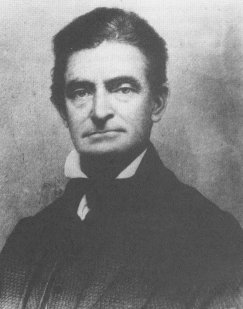I have, may it please the court,
a few words to say.
In the first place, I deny
everything but what I have all along admitted: of a design on my
part to free slaves. I intended certainly to have made a clean
thing of that matter, as I did last winter, when I went into
Missouri and there took slaves without the snapping of a gun on
either side, moving them through the country, and finally leaving
them in Canada. I designed to have done the same thing again on a
larger scale. That was all I intended. I never did intend murder,
or treason, or the destruction of property, or to excite or
incite slaves to rebellion, or to make insurrection.
I have another objection, and
that is that it is unjust that I should suffer such a penalty.
Had I interfered in the manner which I admit, and which I admit
has been fairly proved---for I admire the truthfulness and candor
of the greater portion of the witnesses who have testified in
this case---had I so interfered in behalf of the rich, the
powerful, the intelligent, the so called great, or in the behalf
of any of their friends, either father, mother, brother, sister,
wife, or children, or any of that class, and suffered and
sacrificed what I have in this interference, it would have been
all right. Every man in this court would have deemed it an act
worthy of reward rather than punishment.
This court acknowledges, too, as
I suppose, the validity of the law of God. I see a book kissed,
which I suppose to be the Bible, or at least the New Testament,
which teaches me that all things whatsoever I would that men
should do to me, I should do even so to them. It teaches me,
further, to remember them that are in bonds as bound with them. I
endeavored to act up to the instruction. I say I am yet too young
to understand that God is any respecter of persons. I believe
that to have interfered as I have done, as I have always freely
admitted I have done, in behalf of his despised poor, I did not
wrong but right. Now, if it is deemed necessary that I should
forfeit my life for the furtherance of the ends of justice, and
mingle my blood further with the blood of my children and with
the blood of millions in this slave country whose rights are
disregarded by wicked, cruel, and unjust enactments, I say let it
be done.
Let me say one word further. I
feel entirely satisfied with the treatment I have received on my
trial. Considering all the circumstances, it has been more
generous than I expected. But I feel no consciousness of guilt. I
have stated from the first what was my intention, and what was
not. I never had any design against the liberty of any person,
nor any disposition to commit treason or incite slaves to rebel
or make any general insurrection. I never encouraged any man to
do so, but always discouraged any idea of that kind.
Let me say, also, in regard to
the statements made by some of those who were connected with me,
I hear it has been stated by some of them that I have induced
them to join me. But the contrary is true. I do not say this to
injure them, but as regretting their weakness. Not one but joined
me of his own accord, and the greater part at his own expense. A
number of them I never saw, and never had a word of conversation
with, till the day they came to me, and that was for the purpose
I have stated.
Now I have done. |
